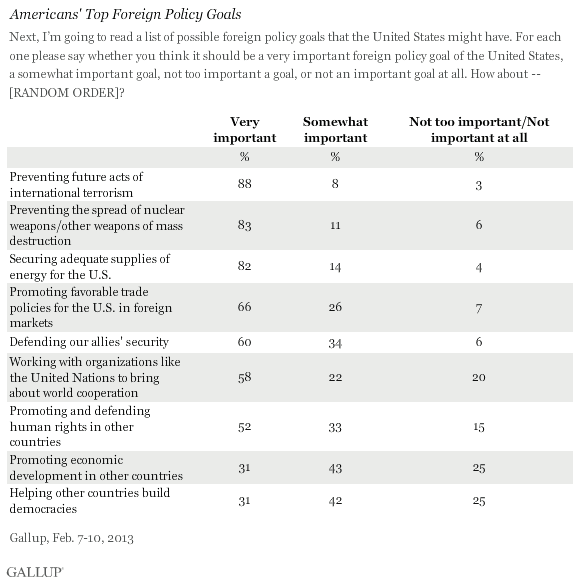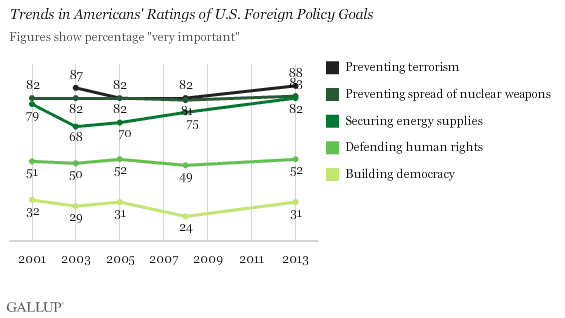PRINCETON, NJ -- Eighty-eight percent of Americans say preventing future acts of international terrorism should be a very important foreign policy goal of the U.S., top among nine issues. Americans also give a high priority to preventing the spread of nuclear weapons and to securing adequate energy supplies for the U.S. Americans are less likely to see promoting economic development in other countries and helping other countries to build democracies as very important U.S. foreign policy goals.

The results are based on Gallup's annual World Affairs poll, conducted Feb. 7-10. The rank ordering of the nine issues tested in the poll indicates that Americans believe the U.S. should focus its foreign policy on matters that can or do affect the country directly -- terrorism, nuclear weapons, energy, and favorable trade policies. Americans give lower priority to matters that involve the U.S. acting on behalf of other countries, including defending U.S. allies, working with international organizations to bring about world cooperation, promoting and defending human rights, and promoting economic development and democracy. These lower priority issues do not have an obvious benefit to the U.S., but they could certainly work to the country's benefit in the long run.
Still, a majority of Americans say each of the nine issues is at least a somewhat important foreign policy goal for the U.S., indicating Americans see some value in pursuing each.
Gallup has asked a version of this question five times since 2001. Each time, preventing terrorism or preventing nuclear weapons has rated as the most important foreign policy goal, with securing adequate energy supplies also ranking relatively high. Building democracy in other countries has consistently ranked near the bottom of the list.
In general, the importance ascribed to each of the different matters has been fairly stable over time, with securing adequate energy supplies showing a bit more variation, ranging from 68% to 82%. That variation could be influenced by the prevailing energy situation, including gasoline prices, at the time each survey was conducted.

Implications
Americans are most likely to say that international issues that have a real or potential direct effect on the U.S. should be very important foreign policy goals for the country. They give a lower priority to matters that involve the U.S. assisting other countries. These preferences have been stable over the past 12 years Gallup has asked this question.
Thus, on the current world stage, for example, it is likely Americans would prioritize the Obama administration's efforts to prevent North Korea from developing a nuclear weapon over providing assistance to democratic movements in several Middle Eastern nations.
That is not to say Americans are highly isolationist, as two-thirds or more believe a variety of actions designed to help out other countries are at least somewhat important for the U.S. to do. But on a relative basis, Americans show much more consensus on prioritizing foreign policy matters that have a more obvious effect on the U.S.
Survey Methods
Results for this Gallup poll are based on telephone interviews conducted Feb. 7-10, 2013, with a random sample of 1,015 adults, aged 18 and older, living in all 50 U.S. states and the District of Columbia.
For results based on the total sample of national adults, one can say with 95% confidence that the margin of sampling error is ±4 percentage points.
Interviews are conducted with respondents on landline telephones and cellular phones, with interviews conducted in Spanish for respondents who are primarily Spanish-speaking. Each sample of national adults includes a minimum quota of 50% cellphone respondents and 50% landline respondents, with additional minimum quotas by region. Landline telephone numbers are chosen at random among listed telephone numbers. Cellphones numbers are selected using random-digit-dial methods. Landline respondents are chosen at random within each household on the basis of which member had the most recent birthday.
Samples are weighted to correct for unequal selection probability, nonresponse, and double coverage of landline and cell users in the two sampling frames. They are also weighted to match the national demographics of gender, age, race, Hispanic ethnicity, education, region, population density, and phone status (cellphone only/landline only/both, cellphone mostly, and having an unlisted landline number). Demographic weighting targets are based on the March 2012 Current Population Survey figures for the aged 18 and older U.S. population. Phone status targets are based on the July-December 2011 National Health Interview Survey. Population density targets are based on the 2010 census. All reported margins of sampling error include the computed design effects for weighting.
In addition to sampling error, question wording and practical difficulties in conducting surveys can introduce error or bias into the findings of public opinion polls.
View methodology, full question results, and trend data.
For more details on Gallup's polling methodology, visit https://www.gallup.com/.
